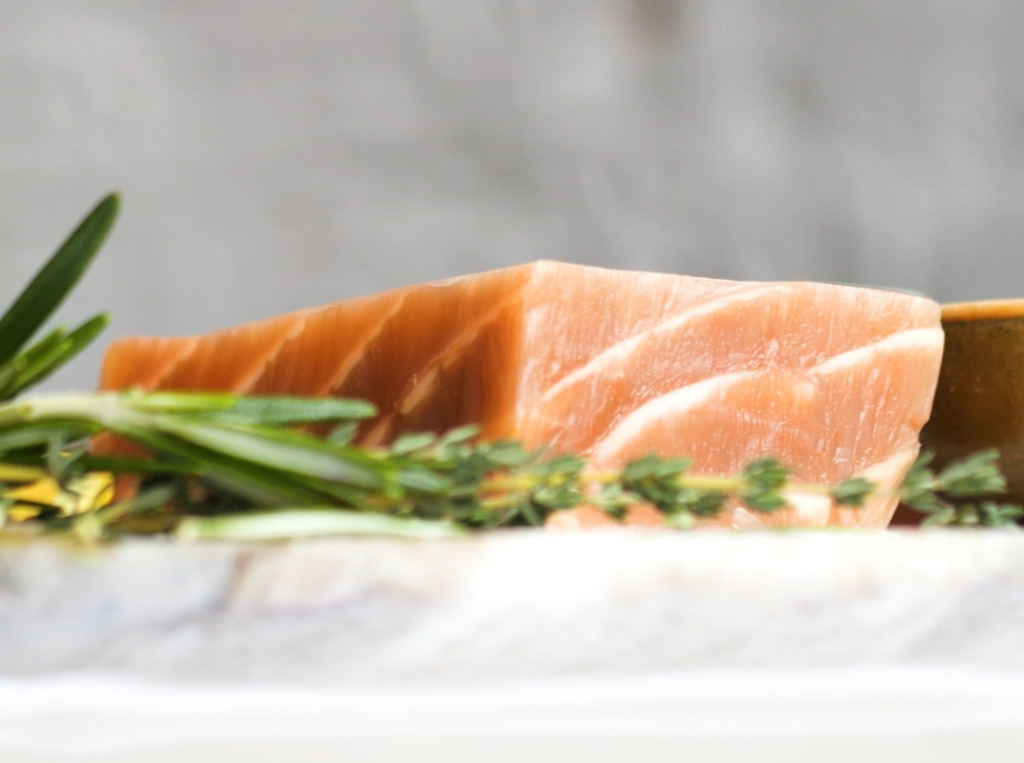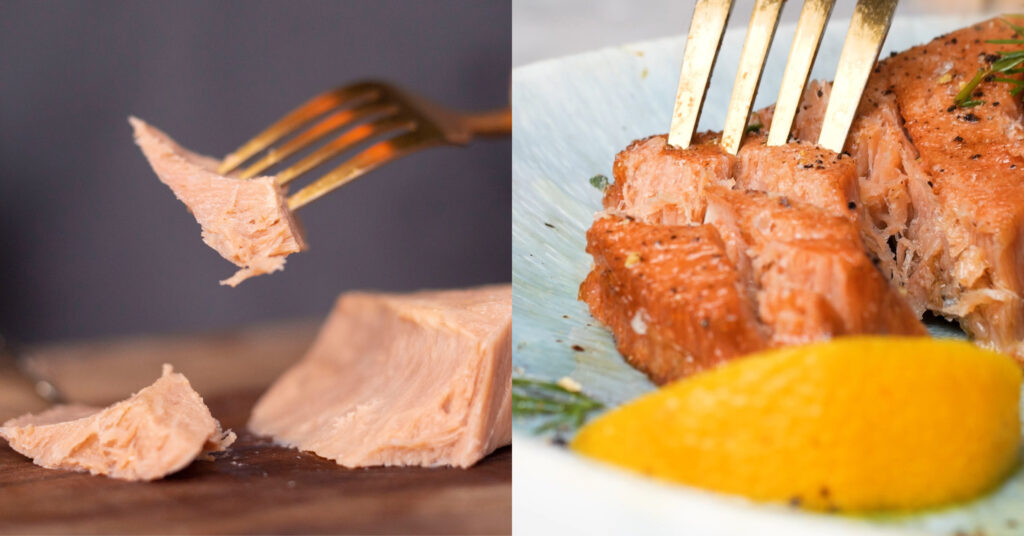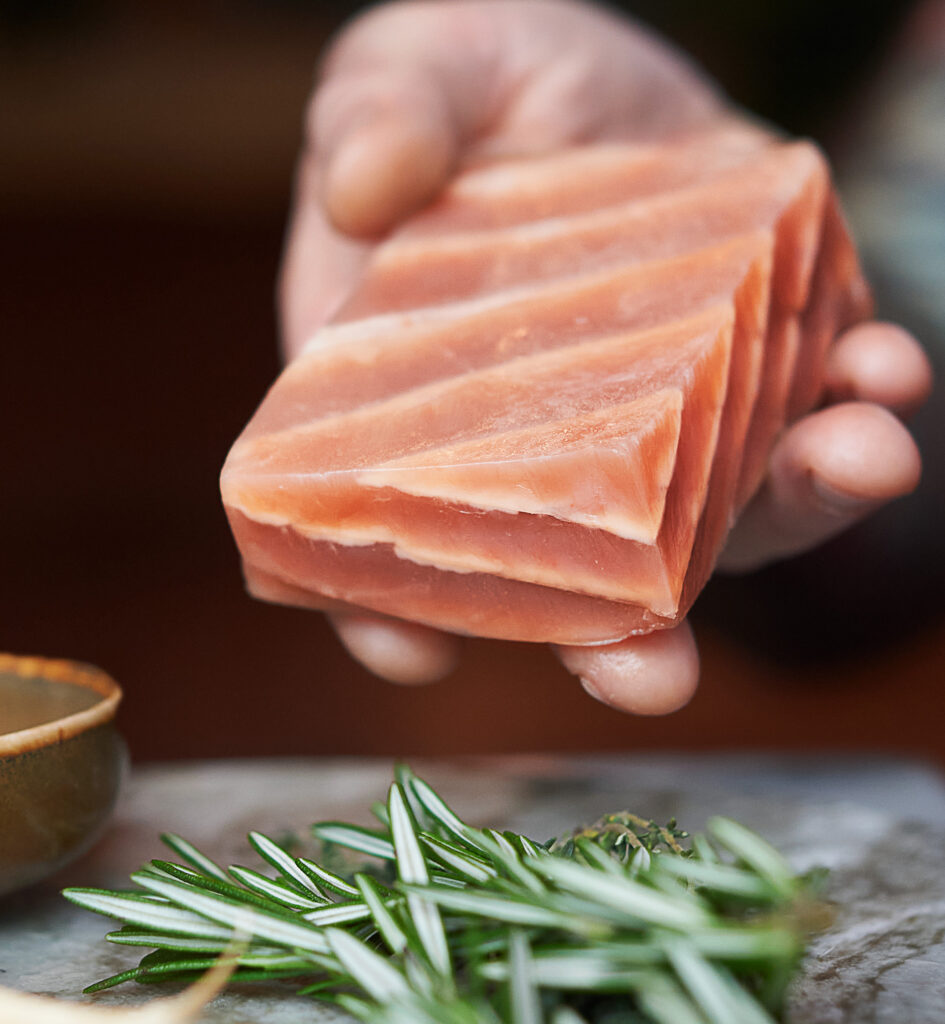
Famed for its wild salmon, British Columbia’s shift to industrial farming has brought threats to human and planetary health. To counter that, three companies are working on a whole-cut plant-based version of Canada’s favourite fish, with financial support from the government.
Nearly 80% of Canadians eat salmon, while one in 10 eat it at least once a week. It’s so ingrained in its national culture that the government calls it “an important icon” for people in Atlantic Canada.
But the country’s wild salmon reserves are depleting, with the fish now classed as an endangered species – last year saw the largest decline in population. Increasing demand has meant a shift away from wild salmon farming and towards intensive practices such as overfishing and habitat destruction, while climate change has further exacerbated that issue.
It’s not just their population that has been endangered – it’s their health too. The farming industry in British Columbia, for example, has been caught dumping piscine orthoreovirus-infected (a fish virus) blood into Canada’s largest wild salmon migration route, while scientists warned as far back as 2012 that a virus was infecting both its farmed and wild salmon – which inevitably affects human health.
The Canadian government, however, failed to pay any heed to these warnings, stating that risks to salmon populations were low. Now, it seems it’s paying a little more attention. One of its five Global Innovation Clusters, the alternative-protein-centric Protein Industries Canada, is making a $4.5M investment in an effort to produce a realistic vegan alternative to wild salmon.
Whole-cut salmon: the holy grail of vegan seafood?

The project involves three Canadian businesses: plant-based seafood company New School Foods, precision fermentation startup Liven Proteins and dehydration solutions provider NuWave Research, with a total investment of $11.4M.
The three companies are working together to commercialise a whole-cut vegan wild salmon product that “transforms from raw to cooked” and promises to offer consumers the same taste and texture as their beloved conventional counterparts. New School Foods has previously unveiled its own whole-cut salmon analogue made from plant fibres, achieved via what the startup describes as proprietary directional-freezing-based scaffolding technology.
The new initiative builds off New School Foods and Liven Proteins’ first project, which proved out the technology necessary to formulate a full muscle-cut product. Alongside NuWave Research, they will now focus on scaling up the production and commercialisation of the salmon.
New School Foods will use its newly developed tech to produce a whole-cut salmon fillet, while Liven is creating animal-free collagen through precision fermentation to replicate the functional and nutritional attributes of conventional salmon, which itself represents a $15B industry. Meanwhile, NuWave Reserach will develop and validate new techniques for its vacuum microwave tech, which will help accelerate the manufacturing of this product.
“These new technologies will support the increased production of a high-quality plant-based salmon fillet alternative, expanding sustainable and nutritious options available to Canadians and helping meet domestic and global demands,” said Canada’s innovation, science and industry minister François-Philippe Champagne.
New School Foods founder and CEO Chris Bryson added: “In addition to optimising our novel food processing technology with the support of our consortium partners, we’ll be building out our own production assembly line, providing a competitive advantage to fine-tune product quality and optimise costs so that we can create a plant-based alternative built for a wide audience.”
“Scalability and product-end applications are key to the success of Liven’s new ingredients, and this project addresses both components,” said Liven co-founder and CEO Fei Luo.
Plant-based investment in Canada soars

Canada’s plant-based market is set to grow by 9.2% annually until 2027. Interest in these foods is growing: government research suggests that over 40% of citizens are actively trying to incorporate more vegan foods into their diets, with plant proteins expected to contribute $4.5B to the country’s GDP growth.
Last year, a third of Canadians tried a plant-based meat alternative, while 42% reported consuming a vegan dairy substitute, according to research by Dalhousie University. Meanwhile, 31% said they consume the former at least once a week, and half said the same for the latter dairy. Another survey revealed that Canadians eat alt-protein (7%) more than pork (5%) or seafood (4%) in a typical week.
“Innovation is an ongoing process. It is the continual improvement of ideas, and the generating and stacking of IP to ultimately create a revolutionary product or service,” added Protein Industries Canada CEO Bill Greuel. “By building off IP generated in the first project, and by bringing in new partners and their IP, new technology is being created, leading to a premier, commercial, first-to-market product.”
Protein Industries Canada’s involvement is its first investment under its second mandate, which began with the 2023-24 fiscal year with an additional $150M in funding from the federal government.
In September, the organisation commissioned a report by Ernst & Young that highlighted great potential for the global plant-based market over the next decade (though these are optimistic numbers with some caveats). The report highlighted a need for increased policy and infrastructure support, as well as more investment in the alt-protein sector in Canada, but said the country has what it takes to be a leader in this space.
This is echoed by the industry think tank the Good Food Institute, which called Canada a “global leader in public funding for plant-based foods” in its 2022 State of the Industry report. It highlighted Protein Industries Canada’s funding of 45 different plant protein R&D projects, which cover areas like regulatory policies as well as increased production.
The project is touted as the “first of its kind to market”, though in Europe, Austrian brand Revo Foods launched a whole-cut vegan salmon in retail earlier this year. Other companies working with whole-cut seafood analogues include Israel’s Oshi (formerly Plantish), Germany’s Esencia Foods, US’s Aqua Cultured Seafood and India’s Seaspire.
The news also comes a week after the launch of Future Ocean Foods, a consortium of 36 companies working to advance the alternative seafood sector – New School Foods is part of the organisation.
The post Famous for Wild Salmon, Canada Invests $11.4M in Whole-Cut Plant-Based Alternative appeared first on Green Queen.
This post was originally published on Green Queen.